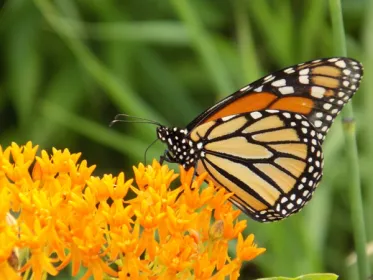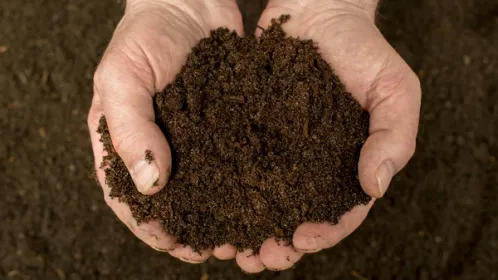Why Pollinators Are Important — And How You Can Help


Every time you bite into a crisp apple, sip a cup of coffee, or enjoy a handful of blueberries, you can thank a pollinator. But the creatures responsible for helping plants reproduce — from bees and butterflies to beetles and birds — are facing enormous threats. And our food system, ecosystems, and communities hang in the balance.
At My Home Park, we know that pollinators do more than power gardens — they support food security, agricultural productivity, and healthy ecosystems. We also know that while humans need crops, our native pollinators and other beneficial insects rely on native plants to support their life cycles. That's why we’ve partnered with The Bee Conservancy to support their Food Justice Award, a national program that helps underserved communities improve pollinator habitat and grow local food systems.
Through our partnership, every purchase of native plants for your own yard means more native plants for an urban farming community in need.
This post explains why pollinators are important, what threatens them, and how you can be part of the solution — right from your own backyard.

What Are Pollinators?

Pollinators are animals — typically insects like bees, butterflies, beetles, moths, and flies — that transfer pollen grains from the male part of a flower to the female part, allowing the plant to reproduce. Some species of birds, like the ruby-throated hummingbird, and even small mammals play a role in this process too.
While some plants rely on wind carries pollen or self pollination, animal pollination is required for the majority of the world’s flowering plants.
How Pollinators Help Plants — and People

Roughly 75% of the world’s flowering plants and about 35% of the world’s food crops depend on pollination services. According to the Food and Agriculture Organization of the United Nations, at least one out of every three bites of food we eat exists because of animal pollinators.
That includes many of our most beloved and nutritious agricultural crops:
- Fruits like apples, strawberries, and melons
- Vegetables like squash, tomatoes, and cucumbers
- Nuts, seeds, and coffee
But pollinators also help maintain green space, support pest control, and enhance carbon sequestration by sustaining the native plant species that anchor ecosystems.
The Economic Value of Pollinators

The economic value of pollinators is enormous — estimated in the hundreds of billions of dollars globally. From supporting farms and food systems to reducing the need for synthetic inputs, pollinators provide vital ecological services that benefit all of us.
Yet despite their vital role, pollinator populations — including native bees, honey bees, and many pollinators — are in decline.
Why Are Pollinators Declining?
Several factors are contributing to the sharp drop in pollinator health:
- Habitat loss due to urban development and industrial farming
- Climate change disrupting weather patterns and bloom times
- Environmental contaminants and pesticides
- Diseases and parasites that affect both honey bees and native pollinators
These changes make it harder for pollinators to find food, shelter, and nesting areas — which in turn affects the many native plants that depend on them.
At My Home Park, we are tackling this global issue head-on, by empowering you to get growing with native plants. We partner with restoration grade native plant nurseries that avoid using any harmful chemicals to bring you native plants that are truly as beneficial as they are beautiful.

Why This Matters for Food Justice

Loss of pollinators doesn’t just threaten plants — it threatens people.
In neighborhoods with limited access to fresh produce, often called food deserts, community gardens and small urban farms provide an essential source of nutrition. These growing spaces rely on local pollinators to pollinate crops, boost yields, and maintain soil health.
That’s why supporting pollinator habitat in underserved areas is a direct investment in food security, health equity, and community resilience.
How My Home Park Is Supporting Change

As part of our mission to restore ecosystems through native plants, My Home Park proudly supports The Bee Conservancy’s Food Justice Award program. This initiative provides pollinator kits, habitat materials, and education to community organizations across the U.S. that are using gardens to fight food insecurity. For every 4 native plants sold as part of this opportunity, My Home Park will go on to donate 1 to The Bee Conservancy's Food Justice Award program.
Together, we’re helping to:
- Improve pollinator habitat in urban areas
- Bring fresh produce to communities in need
- Educate residents about attracting pollinators
- Create vibrant, biodiverse public spaces

How You Can Help Pollinators

Creating your own pollinator garden with plants native to your area is one of the most effective ways to support pollinator health and restore balance to local ecosystems.
Here’s how to get started:
Plant Native Species
Choose native plants that bloom throughout the growing season to provide consistent food sources for bees and other pollinators. My Home Park makes it easy with carefully tailored garden kits and more.
Avoid Pesticides
Many insecticides and herbicides harm pollinators, even in small doses. Choose plants grown via organic practices when possible, and always avoid neonicotinoids. My Home Park's partnered growers produce only restoration grade native plants via organic methods, with zero neonicotinoids and a ton of expertise.
Provide Shelter
Pollinators need places to rest, nest, and overwinter. Leave some bare soil for ground-nesting native bees, and consider adding bee houses for cavity-nesters.
Offer Water
A shallow dish with pebbles and fresh water gives butterflies, bees, and other pollinators a safe place to drink.
Why Native Plants Are Essential
Unlike ornamental landscaping, native plants have co-evolved with local pollinators, providing the exact nectar, pollen, and bloom timing they need to thrive. They also reduce soil erosion, capture carbon dioxide, and support many species of insects, birds, and wildlife.
Meet the Pollinators in Your Garden

From the busy buzz of bumblebees to the flutter of monarch butterflies and moths, native pollinator diversity is both beautiful and necessary. Each group plays a unique role — and together, they keep nature’s systems humming.
By planting for pollinators, you’re not just helping plants reproduce — you’re helping life flourish.
Be Part of the Solution
When you buy native plants from My Home Park's Food Justice Award catalog, you’re doing more than creating a pretty yard — you’re joining a movement to protect pollinators, feed communities, and rebuild the ecological foundation of our food system.

Final Thoughts
Why are pollinators important?
Because without them, ecosystems unravel, food becomes scarce, and communities suffer.
But with them — with butterflies, bees, and native blooms — we have the power to create healthier ecosystems, restore local beauty, and sow resilience where it's needed most.
Let’s grow that future together.
Share this article


